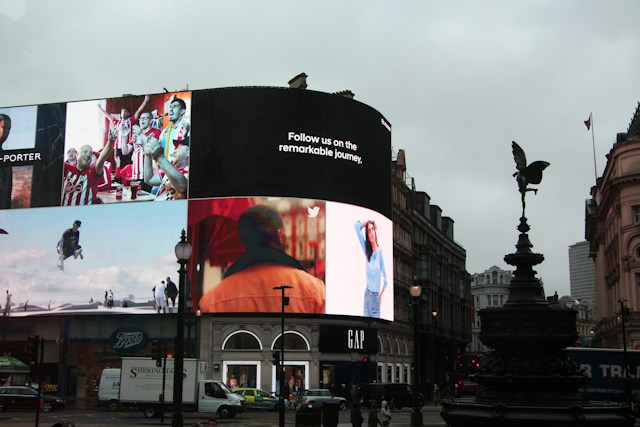
How AI is Shaping Direct-To-Consumer Advertising
06 Feb, 20245 minIn an era where innovative technologies are pushing the boundaries of reality, AI has emerge...

In an era where innovative technologies are pushing the boundaries of reality, AI has emerged as a transformative force in the direct-to-consumer advertising space. As the ongoing digital transformation of society continues to influence customer preferences and behaviours, DTC brands are increasingly turning to AI-driven strategies to create more personalised, engaging, and targeted advertising experiences for customers.
Companies must learn to leverage cutting-edge technology to forge closer connections with their audiences to thrive in the ever-evolving modern advertising industry. In this guide, we’ll explore why AI is of paramount importance to the modern DTC advertising industry and take a look at 3 of the most common applications of AI in the direct-to-consumer
The Significance of AI in the DTC Advertising Industry
Artificial intelligence has been particularly influential among all the innovative technologies that have emerged over the last few years. AI has already significantly reshaped many industries, with notable examples including the rise of automation in the manufacturing industry, AI-powered medical imaging capabilities in healthcare, and AI algorithmic trading in the financial sector. However, the direct-to-consumer advertising industry stands out as a sector that has experienced change owing to the development of AI.
Indeed, the transformational effect of artificial intelligence in the advertising and marketing space cannot be understated. According to figures compiled by Martech, 61.4% of marketers have incorporated AI technology into their marketing efforts, while 44% claim to have used AI in content production. These figures clearly demonstrate the extent to which AI has influenced the direction of the advertising and marketing sectors, and given that the AI market is expected to grow twentyfold by 2030, this trend shows no sign of slowing down any time soon.
Despite concerns about the implications of AI in the modern business world, the increased adoption of AI for marketing and advertising tasks in direct-to-consumer commerce has undoubtedly brought a variety of key advantages for DTC brands, including:
- Personalised Advertising: AI enables highly personalised advertising by analysing consumer data, allowing DTC brands to tailor content and recommendations based on individual preferences and behaviours. This personalisation enhances customer engagement and satisfaction.
- Improved Targeting: AI algorithms analyse vast datasets to identify and target specific audience segments more accurately. This ensures that DTC advertising reaches the right audience, increasing the likelihood of conversions and reducing wasted ad spend.
- Enhanced Customer Experiences: AI technologies, such as chatbots and virtual assistants, provide instant and personalised interactions with consumers. This improves customer experience by addressing queries, offering product recommendations, and facilitating a seamless purchasing process.
- Access to Data-Driven Insights: AI-driven analytics provide valuable insights into consumer behaviour, preferences, and market trends. DTC brands can make informed decisions based on these insights, adapting their strategies to changing market conditions and consumer expectations.
As we can see, AI has been instrumental in changing the face of the direct-to-consumer advertising industry. However, AI is not the only cutting-edge technology being leveraged by DTC brands. If you’d like to learn more about fascinating examples of how the industry’s leading companies utilise innovative technologies for DTC marketing campaigns, we urge you to read our ‘Top DTC Brands Shaping the Future of Ecommerce’ guide.
3 Applications of AI in Direct-To-Consumer Advertising
With more than 80% of industry experts integrating some form of AI technology into their online marketing campaigns, there is every indication that artificial intelligence will remain a core component of the modern advertising space for many years to come. Earlier, we examined how the widespread use of AI in advertising has provided various benefits for DTC brands.
So, if you are a DTC business looking to make the most of the advantages that AI-powered advertising provides, you are probably asking this key question - ‘how do I successfully leverage AI for my direct-to-consumer advertising campaigns?’
To help you answer this query, we’ll delve into the most important applications of AI in the DTC advertising world. Although the way you utilise AI ultimately depends on your unique business needs, we hope this section provides some inspiration for how you can implement AI into your advertising strategy.
1. Predictive Analytics
A common application of AI in DTC advertising is predictive analytics. Using AI and machine learning techniques, DTC brands can identify the likelihood of future outcomes based on data-driven insights. By integrating AI into predictive analytics, direct-to-consumer companies can gain a competitive advantage over their rivals by accurately predicting future customer behaviour.
AI tools can help advertisers pinpoint patterns and trends, allowing them to optimise their campaigns accordingly. A report published by VentureBeat found that 95% of marketing companies now include AI-powered predictive analytics in their advertising strategies, with 44% of those stating that they have integrated it into their strategy completely. These eye-catching statistics highlight how predictive analytics has become part and parcel of the marketing space, but what are the specific ways AI is used in predictive analytics for direct-to-consumer brands?
Here’s how AI can help brands maximise ad campaign impact through predictive analytics:
- Customer Segmentation: DTC brands can use AI algorithms to analyse customer data to segment audiences based on various traits, including demographics, purchase history, and behaviour. In this case, predictive analytics helps advertisers understand different customer segments and how they are likely to behave.
- Demand Forecasting: AI-powered predictive analytics models can predict demand by analysing factors like seasonality, historical data, and other external factors. Direct-to-consumer companies can utilise these vital insights to prevent stock shortages and improve inventory management, ensuring that they can meet customer expectations.
- Churn Prediction and Retention: In the fast-paced world of ecommerce, customer loyalty and retention are crucial, and advertisers can use AI to predict the rates of possible customer churn. AI algorithms can predict which customers are at higher risk of leaving, enabling DTC brands to create strategies for boosting retention, like personalised offers and loyalty schemes.
2. Targeted Advertising
DTC brands often utilise AI-powered tools for targeted advertising. The world of ecommerce is incredibly dynamic, with customer behaviour and purchase patterns changing all the time. To improve conversion rates and customer engagement, direct-to-consumer companies are increasingly providing their customers with more personalised, targeted experiences. Targeted advertising is a central pillar of this strategy, and implementing it successfully can lead to improved brand perception and better financial performance.
So, what do the statistics say about the significance of AI-powered targeted advertising in today’s marketing and advertising industry? There is, in fact, much evidence to support the notion that highly personalised, AI-driven ads are advantageous for companies. Research conducted by Google revealed that AI-driven ad campaigns typically achieve 18% higher conversions for the same cost per action.
Targeted ad campaigns that leverage AI not only benefit DTC brands, they are also appreciated by consumers. In the age of online ecommerce, customers are increasingly expecting personalised online shopping experiences in which the ads, products, and offers they see are tailored to appeal to their preferences. According to the Customer Data Platform Resource, an overwhelming 81% of consumers are open-minded about AI being used in marketing intended to deliver personalised recommendations about services and products.
Let’s examine how DTC brands can use AI to create targeted advertising campaigns:
- Dynamic Ad Content Optimisation: Improving ads in real-time in response to customer interactions and behaviour can be an effective strategy, one that AI can facilitate. AI algorithms can provide you with key insights into how different customer demographics respond to your ads, so you’ll be able to work out whether your ad creatives, messaging, or offers need tweaking.
- Behavioural Targeting: Gaining a solid understanding of your customer’s online behaviour is essential when it comes to developing targeted adverts. You can deliver personalised ads through AI based on specific actions, including website visits, product views, and clicks.
- Tailored Recommendations: AI-powered recommendation engines enable DTC brands to suggest products based on customer preferences and behaviours. By utilising machine learning algorithms, you’ll be able to continually refine recommendations as the preferences of your target audience evolves.
3. Chatbots and Virtual Assistants
AI chatbots and virtual assistants have become an integral part of many DTC brands’ advertising strategies. This cutting-edge technique offers various benefits for companies looking to refine their advertising and marketing efforts, including greater engagement with customers, personalised shopping experiences, and streamlined communication with target audiences. With the global chatbot market expected to reach $1.25 billion by 2025, it is likely that AI-powered conversational advertising tools are likely to remain popular for the foreseeable future.
AI chatbots can be integrated into websites or social media platforms to provide instant support for customers. They can be programmed to answer frequently asked questions, guide users through product selection, and troubleshoot common issues, thereby improving the overall customer experience. There are several ways DTC brands utilise chatbots and virtual assistants in their advertising campaigns, including:
- Personalised Recommendations: By analysing user data and preferences, AI chatbots can offer personalised product recommendations. This helps to facilitate upselling, increasing the likelihood of customers making a purchase.
- Order Tracking and Updates: Chatbots can provide real-time updates on order status, shipping information, and delivery estimates. This helps in keeping customers informed and reduces the number of inquiries related to order tracking.
- Feedback and Surveys: Chatbots can be used to gather feedback from customers regarding their shopping experience, product satisfaction, and overall brand perception. This information can be vital for making data-driven decisions and boosting the quality of products and services.
Many DTC businesses have enjoyed advertising success after utilising AI chatbots and virtual assistants, with one study reporting that 80% of companies use conversational marketing tools to engage with customers and potential clients. From this figure, we see that a large number of firms have placed their faith in this innovative, AI-driven technology, and given the engagement, loyalty, and sales benefits of implementing it, this trend is sure to continue.
Key Takeaways From How AI is Shaping DTC Advertising
The integration of artificial intelligence into the direct-to-consumer advertising landscape is undeniably transforming the industry. As more DTC brands recognise the role AI plays in crafting personalised, targeted, and data-driven advertising experiences, they position themselves to thrive in the competitive advertising market.
The significance of AI in DTC advertising is evident through its ability to enable personalised campaigns, improve targeting accuracy, enhance customer experiences, and provide invaluable data-driven insights. Leveraging AI applications like predictive analytics for customer segmentation, demand forecasting, and churn prediction, as well as utilising targeted advertising tools, ensures that DTC brands stay ahead of the curve.
As we navigate the evolving landscape of modern advertising, embracing innovative technologies like AI and machine learning is a necessity. Implementing successful, AI-powered advertising campaigns is no easy feat, but with the right strategies in place, DTC brands stand to boost sales and customer engagement, all while remaining at the forefront of innovation.
Experts in Providing Digital Recruitment Services
At Sphere, we are passionate about providing market-leading digital recruitment services for companies and job-seekers throughout the UK, Europe, and North America. As an award-winning agency with years of experience, we take pride in connecting top talent with some of the digital world’s most exciting and rewarding roles.
Whether you wish to hire an ambitious graduate looking to embark on a career in the digital sector or an accomplished advertiser with the skills to help your firm flourish, our consultants are here to support you.
Get in touch with us today to discover more about our acclaimed hiring services.



